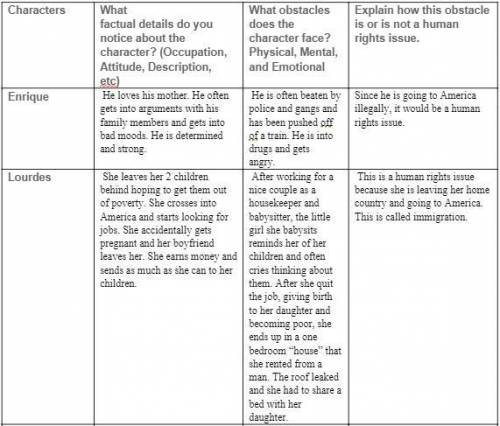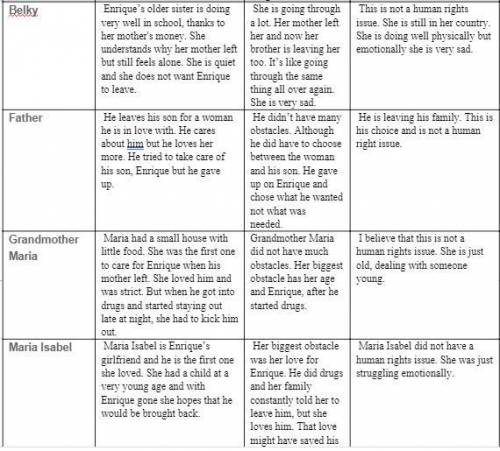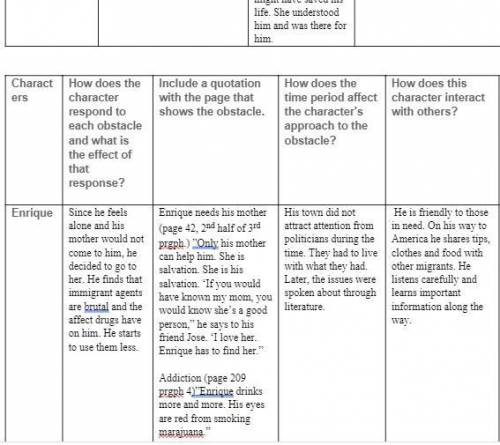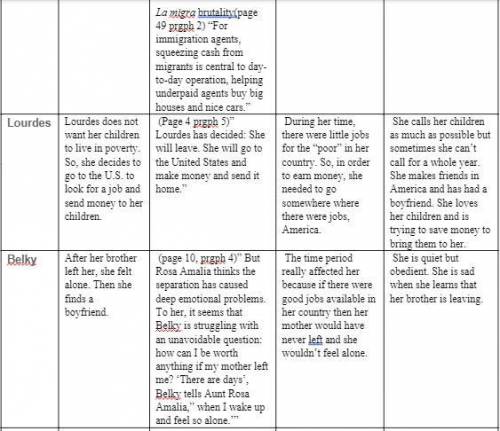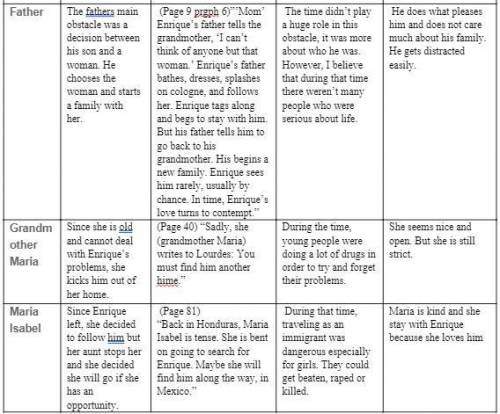
Social Studies, 22.11.2019 09:31 22ksotoq
100 points
i'm reading "enrique's journey: a boy left behind"
and i need with this can anyone
fill in your observations as you read.
characters
what
factual details do you notice about the character? (occupation, attitude, description, etc)
what obstacles does the character face? physical, mental, and emotional
explain how this obstacle is or is not a human rights issue.
how does the character respond to each obstacle and what is the effect of that response?
include a quotation with the page that shows the obstacle.
how does the time period affect the character's approach to the obstacle?
how does this character interact with others?
enrique
lourdes
belky
father
grandmother maria
maria isabel
historical questions to ask yourself while you are reading:
what is going on during the time period of your book? (war, drought, excess of money, prejudices, political unrest, etc.)
how does that element affect the plot, setting, and characters of your book?
why did the author use this time period?
after you have finished reading, use your graphic organizer to answer these eight questions.
what is the human rights issue in my book?
where does this issue first come up in my book?
where in my book does this issue become most important?
how is this issue presented in my book?
in my book, who suffers due to the human rights issue?
what does the wording in my quotations imply?
when this issue becomes most important, what happens?
how is this issue resolved in my book?

Answers: 3


Another question on Social Studies

Social Studies, 22.06.2019 16:00
China wants to take control over social media in which other region? question 4 options: taiwan chile japan hong kong
Answers: 2

Social Studies, 22.06.2019 17:10
In writing about her findings in a brazilian shantytown, nancy scheper-hughes’s account of alto do cruzeiro provides a window into the terrible toll of nonconsensual organ harvesting among the poor, as well as how she herself changed over time. how might an anthropologist justify the publication of this ethnographic research when considering the problem of ethnographic authority? a. all of the poor must be given an equal voice, thus polyvocality is justification. b. anthropologists are themselves changed in fieldwork, and so honest reflexivity is justification. c. the horrific conditions made it impossible to ignore, and since she obtained informed consent, this is justification. d. authoritative writing asks us to consider what right we have to report, thus a moral challenge is justification.
Answers: 3

Social Studies, 23.06.2019 01:40
Which of the following variables has the strongest influence on the variations found in american family life? a.race and ethnicity b.religious affiliation c.social class and culture d.education and occupation
Answers: 1

Social Studies, 23.06.2019 03:30
What two emerging factors after the war of 1812 contributed to the development of sctionalism
Answers: 1
You know the right answer?
100 points
i'm reading "enrique's journey: a boy left behind"
and i need with t...
i'm reading "enrique's journey: a boy left behind"
and i need with t...
Questions

English, 21.09.2019 05:30




Biology, 21.09.2019 05:30


Mathematics, 21.09.2019 05:30

Chemistry, 21.09.2019 05:30

Mathematics, 21.09.2019 05:30


Biology, 21.09.2019 05:30

History, 21.09.2019 05:30



Mathematics, 21.09.2019 05:30


Computers and Technology, 21.09.2019 05:30


History, 21.09.2019 05:30

English, 21.09.2019 05:30

